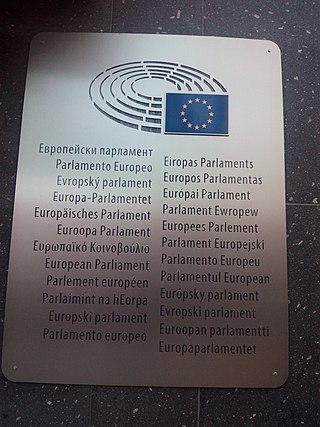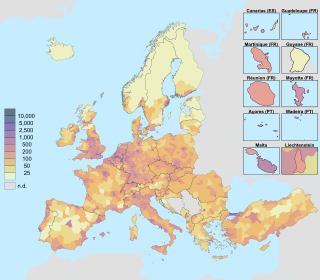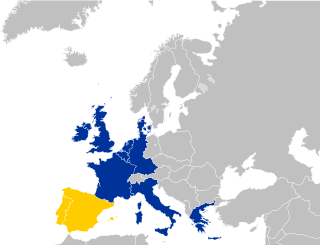Related Research Articles

Natura 2000 is a network of nature protection areas in the territory of the European Union. It is made up of Special Areas of Conservation and Special Protection Areas designated under the Habitats Directive and the Birds Directive, respectively. The network includes both terrestrial and Marine Protected Areas.

The European Union (EU) has 24 official languages, of which three – English, French and German – have the higher status of "procedural" languages of the European Commission. Irish previously had the lower status of "treaty language" before being upgraded to an official and working language in 2007. However, a temporary derogation was enforced until 1 January 2022. The three procedural languages are those used in the day-to-day workings of the institutions of the EU. The designation of Irish as a "treaty language" meant that only the treaties of the European Union were translated into Irish, whereas Legal Acts of the European Union adopted under the treaties did not have to be. Luxembourgish and Turkish, which have official status in Luxembourg and Cyprus, respectively, are the only two official languages of EU member states that are not official languages of the EU. In 2023, the Spanish government requested that its regional languages Catalan, Basque, and Galician be added to the official languages of the EU.

The Trans-European Transport Network (TEN-T) is a planned network of roads, railways, airports and water infrastructure in the European Union. The TEN-T network is part of a wider system of Trans-European Networks (TENs), including a telecommunications network (eTEN) and a proposed energy network. The European Commission adopted the first action plans on trans-European networks in 1990.

The Interrail Pass is a rail pass available to European residents. Residents of countries outside Europe may purchase the Eurail Pass instead. Types of Interrail Pass include the Interrail Global Pass and the Interrail One Country Pass.

The regional policy of the European Union (EU), also referred as Cohesion Policy, is a policy with the stated aim of improving the economic well-being of regions in the European Union and also to avoid regional disparities. More than one third of the EU's budget is devoted to this policy, which aims to remove economic, social and territorial disparities across the EU, restructure declining industrial areas and diversify rural areas which have declining agriculture. In doing so, EU regional policy is geared towards making regions more competitive, fostering economic growth and creating new jobs. The policy also has a role to play in wider challenges for the future, including climate change, energy supply and globalisation.

European Heritage Days (EHD) is a joint action of the Council of Europe and the European Commission involving all 50 signatory states of the European Cultural Convention under the motto, Europe: a common heritage. The annual programme offers opportunities to visit buildings, monuments and sites, many of which are not normally accessible to the public. It aims to widen access and foster care for architectural and environmental heritage. These events are also known as Doors Open Days and Open Doors Days in English-speaking countries.

Immigration to Europe has a long history, but increased substantially after World War II. Western European countries, especially, saw high growth in immigration post 1945, and many European nations today have sizeable immigrant populations, both of European and non-European origin. In contemporary globalization, migrations to Europe have accelerated in speed and scale. Over the last decades, there has been an increase in negative attitudes towards immigration, and many studies have emphasized marked differences in the strength of anti-immigrant attitudes among European countries.
The Young Europeans Reports is a series of representative surveys of young Europeans (15-24) conducted on behalf of the European Commission, and is part of the Eurobarometer. While the first survey, conducted in 1982, covered only ten countries, the second and third included 12 members of the EU, and fourth included 15 EU countries: Belgium, Denmark, Finland, Germany, Greece, Ireland, Spain, France, Italy, Luxembourg, The Netherlands, Austria, Portugal, and Sweden, and the United Kingdom. The surveys repeat many of the same questions, thus allowing comparison over time. They are each carried out in conjunction with the large and more general Eurobarometer surveys, thus allowing comparison between the young population and general population.

The Schengen Area is an area comprising 27 European countries that have officially abolished many passport and many other types of border control at their mutual borders. Being an element within the wider area of freedom, security and justice policy of the European Union (EU), it mostly functions as a single jurisdiction under a common visa policy for international travel purposes. The area is named after the 1985 Schengen Agreement and the 1990 Schengen Convention, both signed in Schengen, Luxembourg.

The demographics of the European Union show a highly populated, culturally diverse union of 27 member states. As of 1 January 2023, the population of the EU is slightly over 448 million people.
The European Union Prize for Literature (EUPL), established in 2009, is a European Union literary award. Its aim is to recognise outstanding new literary talents from all over Europe, to promote the circulation and translation of literature amongst European countries, and to highlight the continent's creativity and diversity.
The European Inventor Award, are presented annually by the European Patent Office, sometimes supported by the respective Presidency of the Council of the European Union and by the European Commission, to inventors who have made a significant contribution to innovation, economy and society, predominantly in Europe. Inventions from all technological fields are considered for this award. The winners in each category are presented with an award shaped like a sail. There is no cash prize associated with the award, however there is a cash prize for all 3 of the Young Inventors Prize finalists.

Shane Breen is an Irish show jumper.

The Treaty of Accession 1985 was the agreement between the member states of the European Communities, Spain and Portugal, concerning these countries' accession into the EC. It entered into force on 1 January 1986. The Treaty arranged accession of Spain and Portugal to the EC and amended earlier treaties of the European Communities. As such it is an integral part of the constitutional basis of the European Union.

The Treaty of Accession 1979 was the agreement between the European Communities and Greece, concerning this country's accession into the EC. It entered into force on 1 January 1981. The Treaty arranged accession of Greece to the EC and amended earlier treaties of the European Communities. As such it is an integral part of the constitutional basis of the European Union.
2014 Rugby Europe Women's Sevens Grand Prix Series was the top level of international women's rugby sevens competitions organised by Rugby Europe during 2014. The series featured two tournaments, one hosted in Moscow and one hosted in Brive-la-Gaillarde. England won the Moscow tournament while France won the Brive tournament. Russia won the overall championship after finishing as runners-up in both tournaments.
The 2006 European Women Sevens Championship was the fourth edition of the European Women's Sevens Championship.
The 2007 European Women Sevens Championship was the fifth edition of the European Women's Sevens Championship.
The 2012 European Women Sevens Championship was the tenth edition of the European Women's Sevens Championship.
The European Network of Civil Aviation Safety Investigation Authorities (ENCASIA) is a network of civil aviation accident investigation authorities of the European Union.
References
- ↑ "EU Prize for Women Innovators 2022: the winners". eic.ec.europa.eu. European Innovation Council. Retrieved 12 October 2023.
- ↑ "Prix européen des femmes innovatrices 2017: la Commission récompense quatre brillantes femmes entrepreneurs". Europa.eu (in French). 8 March 2017. Retrieved 18 February 2018.
- ↑ "2016 Contest". ec.europa.eu. Archived from the original on 19 September 2017.
- ↑ "Prix "Femmes innovatrices" 2014: la Commission récompense des lauréates originaires d'Allemagne, des Pays-Bas et d'Espagne". europa.eu (in French). 7 March 2014. Retrieved 18 February 2018.